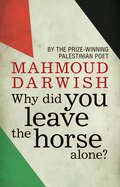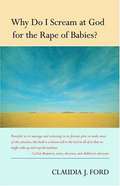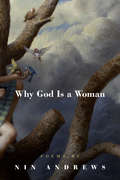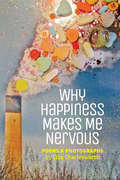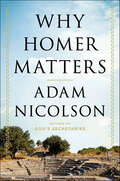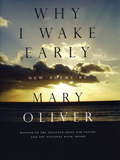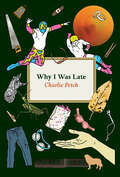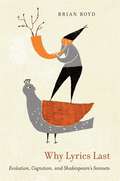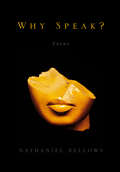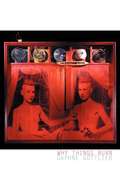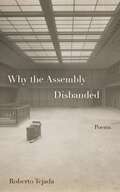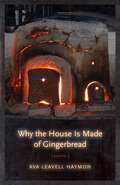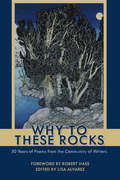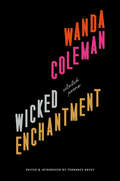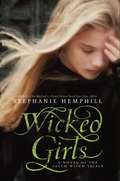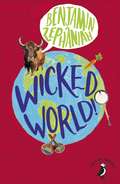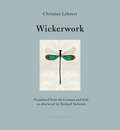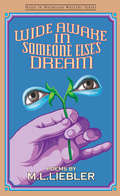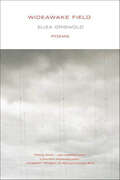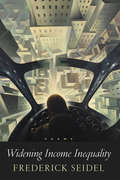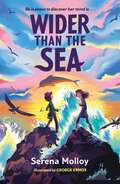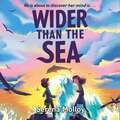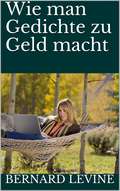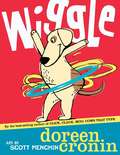- Table View
- List View
Why Did You Leave the Horse Alone?
by Mahmoud Darwish Mohammad ShaheenA stunning new translation of Mahmoud Darwish's intertwining poetic narrative, presenting a profound portrait of the Palestinian people, the human condition, and Darwish's own hopes and dreamsSince Mahmoud Darwish's death, his poetic writings continue to be read by an audience in awe. This is a collection of autobiographical poetry designed to give an insight into the wider human condition. Darwish explores the meaning of life, identity, and the impact of exile. Hailed as the most important Arab poet of the modern day, Darwish's voice has come to represent a generation and the Palestinian people in the midst of the tense political situation in the Middle East. While Darwish explored themes of lost Eden, exile, and life after death, he resisted classification as a spokesperson for the Palestinian cause, and refused to use his art for purely political ends. Darwish's was a nomadic existence, much of it spent in international exile, and these experiences lent his writing a cosmopolitan edge—they partake of a worldwide mythology.
Why Do I Scream at God for the Rape of Babies?
by Claudia J. FordAt the center of Why Do I Scream at God for the Rape of Babies? is the tragic story of a five-month-old South African baby named Vyanna who is left alone in a Johannesburg porn theater by her homeless mother and then gang-raped. The story's heart, however, is one of healing, courage and growing love that Vyanna's adoptive mother experiences from the moment she sees the little girl. Journal entries, letters to friends and South African courts, and memories weave together Ford's two-year chronicle of a most unusual—and rewarding—mother-daughter relationship.
Why God Is a Woman
by Nin AndrewsWhy God Is a Woman is a collection of poems written about a magical island where women rule and men are the second sex. It is also the story of a boy who, exiled from the island because he could not abide by its sexist laws, looks back with both nostalgia and bitterness and wonders: Why does God have to be a woman? Celebrated prose poet Nin Andrews creates a world both fantastic and familiar where all the myths, logic, and institutions support the dominance of women.Nin Andrews's books include The Book of Orgasms and Sleeping with Houdini.
Why Happiness Makes Me Nervous
by Liza CharlesworthIn words and pictures, Liza Charlesworth's new book, Why Happiness Makes Me Nervous, captures the poetic journey of a girl's complicated coming of age. Loneliness, divorce, loss, love, burgeoning sexuality, and those awkward, epic years between adolescent and adulthood are explored in the pairing of these riveting poems and vivid photographs.
Why Homer Matters
by Adam Nicolson"Adam Nicolson writes popular books as popular books used to be, a breeze rather than a scholarly sweat, but humanely erudite, elegantly written, passionately felt…and his excitement is contagious."—James Wood, The New YorkerAdam Nicolson sees the Iliad and the Odyssey as the foundation myths of Greek—and our—consciousness, collapsing the passage of 4,000 years and making the distant past of the Mediterranean world as immediate to us as the events of our own time.Why Homer Matters is a magical journey of discovery across wide stretches of the past, sewn together by the poems themselves and their metaphors of life and trouble. Homer's poems occupy, as Adam Nicolson writes "a third space" in the way we relate to the past: not as memory, which lasts no more than three generations, nor as the objective accounts of history, but as epic, invented after memory but before history, poetry which aims "to bind the wounds that time inflicts."The Homeric poems are among the oldest stories we have, drawing on deep roots in the Eurasian steppes beyond the Black Sea, but emerging at a time around 2000 B.C. when the people who would become the Greeks came south and both clashed and fused with the more sophisticated inhabitants of the Eastern Mediterranean.The poems, which ask the eternal questions about the individual and the community, honor and service, love and war, tell us how we became who we are.
Why I Wake Early
by Mary OliverThe forty-seven new works in this volume include poems on crickets, toads, trout lilies, black snakes, goldenrod, bears, greeting the morning, watching the deer, and, finally, lingering in happiness. Each poem is imbued with the extraordinary perceptions of a poet who considers the everyday in our lives and the natural world around us and finds a multitude of reasons to wake early.
Why I Was Late
by Charlie PetchWith kitchen-table candour and empathy, Charlie Petch's debut collection of poems offers witness to a decades-long trans/personal coming of age, finding heroes in unexpected places. Why I Was Late fuses text with performance, bringing a transmasculine wisdom, humour, and experience to bear upon tailgates, spaceships, and wrestling rings. Fierce, tender, convention re-inventing—Petch works hard. And whether it's as a film union lighting technician, a hospital bed allocator, a Toronto hot dog vendor, or a performer/player of the musical saw, the work is survival. Heroes are found in unexpected places, elevated by both large and small gestures of kindness, accountability and acceptance. No subject—grief, disability, kink, sexuality, gender politics, violence—is off limits. A poet so good at drag they had everyone convinced that they were a woman for the first forty years of their life, Petch has somehow brought the stage and its attendant thrills into the book. Better late than. And better. "Charlie Petch's Why I Was Late is a poetic debut with the wisdom of a sage and the emotional range of an expert comedian. … Do yourself a favor and read this book. This is a master at work."—Kai Cheng Thom, author of I Hope We Choose Love: A Trans Girl's Notes from the End of the World
Why Lyrics Last
by Brian BoydIn Why Lyrics Last, the internationally acclaimed critic Brian Boyd turns an evolutionary lens on the subject of lyric verse. He finds that lyric making, though it presents no advantages for the species in terms of survival and reproduction, is âeoeuniversal across cultures because it fits constraints of the human mind. âe#157; An evolutionary perspectiveâe" especially when coupled with insights from aesthetics and literary historyâe"has much to tell us about both verse and the lyrical impulse. Boyd places the writing of lyrical verse within the human disposition âeoeto play with pattern,âe#157; and in an extended example he uncovers the many patterns to be found within Shakespeareâe(tm)s Sonnets. Shakespeareâe(tm)s bid for readership is unlike that of any sonneteer before him: he deliberately avoids all narrative, choosing to maximize the openness of the lyric and demonstrating the power that verse can have when liberated of story. In eschewing narrative, Shakespeare plays freely with patterns of other kinds: words, images, sounds, structures; emotions and moods; argument and analogy; and natural rhythms, in daily, seasonal, and life cycles. In the originality of his stratagems, and in their sheer number and variety, both within and between sonnets, Shakespeare outdoes all competitors. A reading of the Sonnets informed by evolution is primed to attend to these complexities and better able to appreciate Shakespeareâe(tm)s remarkable gambit for immortal fame.
Why Speak?: Poems
by Nathaniel Bellows"A smart and powerful debut."--Library Journal A debut collection, exhibiting exceptional narrative and lyrical gifts, that explores the realms of memory, human emotion, and the natural world.These layered, braided narratives combine images of landscape and nature, childhood memories and family history, evoked paintings and performances. Nathaniel Bellows's verse is intimate yet inviting, dark but hopeful: "I could not saw the fallen tree--not all / of it had fallen--because somehow each spring, / the rotted half still mysteriously bloomed."
Why Things Burn: Poems
by Daphne GottliebFor many performance poets, the simple act of writing down the words can kill a poem's spirit and energy. Not so with Daphne Gottlieb. In Why Things Burn, Gottlieb tackles sexuality, lesbian issues, rape, urban life, and a host of other topics with the same power of her live performances.
Why You Should Laugh Three Times a Day
by Kimberling Galeti KennedyWhy You Should Laugh Three Times a Day always has a positive message included in each imaginative, inspiring and rhythmic story it tells. Furthermore, it is sure to be a joyful and entertaining read for you and every beloved child in your life.
Why the Assembly Disbanded
by Roberto TejadaPushing the boundaries of Latinx literature and what constitutes a borderlands poetics.Throughout Roberto Tejada’s body of work, the renowned poet and celebrated critic has explored themes of Latinx culture, politics, history, language, and ecologies. In his latest collection, Why the Assembly Disbanded, he presents a unique contribution to Latinx letters that reflects on the relations between the United States and Latin America, especially their real and symbolic borderlands.Immersive, postmodern, and philosophical, Why the Assembly Disbanded provides an associative, critical Latinx aesthetic connecting the Mexico–United States borderlands to Latin America’s neo-baroque heritage. Migrants, settlers, tourists, and exiles moving across various hemispheric landscapes are featured in these exuberant, capacious, and self-reflexive poems. Tejada relates the ravages of white supremacy in our culture that, together with immigrant precarity, turn home into a place of foreboding and impending eviction, even as a dream-weather makes room at last for scenes of possibility and attainment in the account of human history. The sweeping futuristic vistas open on to narratives of colonial extraction, human displacement, abuses of capitalism, mass media spectacle, the antagonism of language and technical images in the sensorium of urban and digital life-worlds, and the relations of desire encouraged by pictures and words in the economy of attention. Los Angeles and Mexico City figure prominently in poems committed to voicing modes of formation and community in an intersectional reckoning of personhoods prompted in work by artists Betye Saar, Amiri Baraka, Connie Samaras, and Rubén Ortiz Torres.With language given to pageantry, tonal precision, and a hopeful lyric radiance that can accommodate ecstasy and justice, Roberto Tejada’s carnivalesque, borderland imagery pushes the boundaries of Latinx literature. World-building by way of reverie, speculation, and retro-futurist tableaux, and with vivid, sometimes violent particularity, his poems enact hallucinatory realities of the hemisphere: an imagination that triangulates history, lyricism, and art as social practice.
Why the House Is Made of Gingerbread: Poems
by Ava Leavell HaymonIn Ava Leavell Haymon's third collection, an unremarkable, harried, contemporary woman named Gretel finds herself at midlife overtaken by the Grimms' household tale "Hansel and Gretel." The violence and terror in that story supplant the memory of her own childhood, and the fairy tale retells itself in a sharp succession of surprising poems. <P><P>The witch, the sugar house, Gretel's brother, her passive father, his cruel second wife, the sinister forest -- all these and more rise like jazz motifs to play themselves in the present. Addressing themes such as hunger, child abuse, betrayal, cannibalism, and murder in a tone by turns disturbing and humorous, Why the House Is Made of Gingerbread is most certainly not a book for children.
Why to These Rocks: 50 Years of Poems from the Community of Writers
by Robert HassFifty years of poems from the Community of Writers’ poetry workshop The Community of Writers (formerly Squaw Valley Writers’ Conference) celebrates fifty years of its annual summer poetry workshop in Olympic Valley, California, with this collection of one hundred and forty poems first composed there. Edited by writers workshop codirector Lisa Alvarez and introduced by longtime poetry director Robert Hass, the book is divided into three sections: poems that evoke the Valley’s physical setting, with its granite-and-pine mountain beauty; poems that peer into the poetic process, filled with inspiration and idiosyncrasy; and poems of all shapes and kinds that owe their origins to the workshop and its productive morning review sessions. Contributors include both workshop staff and participants, among them Lucille Clifton, Sharon Olds, Al Young, Matthew Zapruder, Harryette Mullen, Galway Kinnell, Rita Dove, Cornelius Eady, Robert Hass, and Forrest Gander. The title of the collection comes from a question posed by original poetry director Galway Kinnell: &“Then why to these rocks / Do I keep coming back why.&” It speaks to the special community nurtured in this stunning setting, one that has inspired poets worldwide—many of whom developed significant bodies of award-winning work in its creative and generative atmosphere.
Wicked Enchantment: Selected Poems
by Wanda ColemanA voice for justice, anti-racism, and equality—here is the greatest and most powerful work of the people’s poet, Wanda Coleman.One of the most talked about literary collections of the year is this collection by a beat-up, broke, and Black woman who wrote with anger, humor, and clarity about her life on the margins. Wicked Enchantment: Selected Poems is a selection of 130 of Coleman’s poems spanning four decades, edited and introduced by Terrance Hayes. Although Coleman was rejected by the literary elites during her lifetime, here’s what people are saying now about Wicked Enchantment:“Wanda Coleman is not just wickedly wise, she is transcendent.” —The Washington Post“These poems are wildly fun and inventive . . . and frequently hilarious; they seem to cover every human experience and emotion.” —The New York Times“Wanda Coleman’s work has that ineffable quality that accompanies poetry you understand in your belly and your head. . . . It is an unmistakable style that propels a Coleman poem, and draws us into it.” —Reginald Dwayne Betts“Wicked Enchantment has words to crack you open and heal you where it counts—hateful and hilarious, heartbroke and hellbent.” —Mary Karr, New York Times bestselling author“One of the greatest poets ever to come out of L.A.” —The New Yorker“One of the most exciting, original, deliciously dangerous voices of the 20th century.” —The Irish Times“Required Reading” —Bustle“Best Poetry of 2020” The New York Times, The Washington Post, The Irish TimesWinner California Independent Booksellers Alliance’s 2020 Golden Poppy Award for Poetry
Wicked Girls
by Stephanie HemphillWhat started out as girls' games became a witch hunt. Wicked Girls is a fictionalized account of the Salem witch trials told from the perspectives of three of the real young women living in Salem in 1692. Ann Putnam Jr. plays the queen bee. When her father suggests that a spate of illnesses within the village is the result of witchcraft, Ann grasps her opportunity. She puts in motion a chain of events that will change the lives of the people around her forever. Mercy Lewis, the beautiful servant in Ann's house, inspires adulation in some and envy in others. With a troubled past, she seizes her only chance at safety. Margaret Walcott, Ann's cousin, is desperately in love and consumed with fiery jealousy. She is torn between staying loyal to her friends and pursuing the life she dreams of with her betrothed. With new accusations mounting daily against the men and women of the community, the girls will have to decide: Is it too late to tell the truth? A Printz Honor winner for Your Own, sylvia, Stephanie Hemphill uses evocative verse to weave a nuanced portrait of one of the most chilling and fascinating times in our nation's history.
Wicked World! (Puffin Poetry)
by Benjamin ZephaniahWelcome to the wild and wicked words of Benjamin Zephaniah. You'll find loads of cool people who make up our world in this rapping, happening hip-hop collection. From the South Pole to Mongolia and the Himalayas, this is a real world tour of poems about people and places, cultures and nationalities across our planet.Includes poems about Inuits, Celts, the history of Britain, Maories, the Dalai Lama, the North and South Poles, and much more - a rhyming round-the-world trip.Poems that bounce up from the page and demand to be read, rapped, sung and hip-hopped aloud - Independent on Sunday
Wickerwork
by Christian LehnertVivifying poetry of nature and the spirit — explore a mystical world of hawkmoths and elvers, skylarks and salamanders, with the shimmering grace of Gary Snyder&“Lehnert makes nature&’s wonders shine. His poems expand our view of life – and its inexpressible reason for being.&” – Der SonntagWickerwork traffics in details that might have otherwise gone unnoticed: the far sides of fishes, red jellyfish fraying on a tide, the way a hazel tree learns from the falling of snow how to scatter her pollen. This bilingual edition is the first comprehensive collection of Christian Lehnert&’s work to appear in English, translated by the celebrated translator and scholar, Richard Sieburth.Readers can dive down into the depths of Lehnert and Sieburth&’s primordial works: where slime, dirt, membranes, clay, and clouds give way to stretching summer shadows under beech trees, the clatter of a bird lifting into sky. Ever attentive to the rattle of a rhythm passing through language, Lehnert sees in the nimble scurrying of a salamander &“tiny bolts of lightning driven through the dark.&” He writes with singular grace of a sycamore&’s sap, &“the blood scabbing the wounds of its roots.&”With its intense, philosophical relationship to the physical world, Wickerwork will open readers&’s eyes to their own natural environment. Lehnert notes that certain trees have the power to remind us that the growth and protean spirit of things is never in doubt. Here, growth feels possible, necessary, a fact as simple as it is divine.
Wide Awake in Someone Else's Dream: Wide Awake In Someone Else's Dream
by M. L. LieblerA new collection from Detroit poet M. L. Liebler, a unique voice in contemporary poetry.
Wideawake Field: Poems
by Eliza GriswoldThe chairs have come in and the crisp yellow thwock of the ball being hit says somehow, now that it's fall, I'm a memory of myself. My whole old life—I mourn you sometimes in places you would have been.—OctoberThe poems in this fierce debut are an attempt to record what matters. As a reporter's dispatches, they concern themselves with different forms of desolation: what it means to feel at home in wrecked places and then to experience loneliness and dislocation in the familiar. The collection arcs between internal and external worlds—the disappointment of returning, the guilt and thrill of departure, unexpected encounters in blighted places— and, with ruthless observations etched in the sparest lines, the poems in Wideawake Field sharply and movingly navigate the poles of home and away.
Widening Income Inequality: Poems
by Frederick Seidel"One of the world's most inspired and unusual poets . . . [Seidel's] poems are a triumph of cosmic awe in the face of earthly terror." --Hillel Italie, USA TodayFrederick Seidel has been called many things. A "transgressive adventurer," "a demonic gentleman," a "triumphant outsider," "a great poet of innocence," and "an example of the dangerous Male of the Species," just to name a few. Whatever you choose to call him, one thing is certain: "he radiates heat" (The New Yorker). Now add to that: the poet of aging and decrepitude. Widening Income Inequality, Seidel's new poetry collection, is a rhymed magnificence of sexual, historical, and cultural exuberance, a sweet and bitter fever of Robespierre and Obamacare and Apollinaire, of John F. Kennedy and jihadi terror and New York City and Italian motorcycles. Rarely has poetry been this true, this dapper, or this dire. Seidel is "the most poetic of the poets and their leader into hell."
Wider Than The Sea
by Serena MolloyThe powerful tale of a girl who feels broken, and the dolphin who makes her whole. A story of friendship, hope and self-discovery, perfect for readers aged 9+, and beautifully illustrated in black and white by George Ermos.Ró finds school impossible. She knows people think she's shy - and stupid. But when she goes to the bay each afternoon to watch the dolphin leap through the water, she finds the strength to keep going. Then the dolphin disappears, and everything starts falling apart.Can Ró overcome her fears to find him?I watch each rise and dip of wave know Sunny must be out there somewhere wonder if he's missing me. I remember that moment when I touched his skin and know that finding him is the only thing that can make the aching stop make me feel not broken.
Wider Than The Sea: A dyslexia-friendly story of friendship, hope and self-discovery
by Serena MolloyRó risks everything in her search for a missing dolphin, and discovers just how powerful she can be. This uplifting novel in verse will inspire readers of all abilities in its celebration of inclusivity. Perfect for fans of A Kind of Spark.Ró finds school impossible. She knows people think she's shy - and stupid. But when she goes to the bay each afternoon to watch the dolphin leap through the water, she finds the strength to keep going. Then the dolphin disappears, and everything starts falling apart.How much is Ró willing to risk to find him?I watch each rise and dip of wave know Sunny must be out there somewhere wonder if he's missing me. I remember that moment when I touched his skin and know that finding him is the only thing that can make the aching stop make me feel not broken.
Wie man Gedichte zu Geld macht
by Bernard Levine Roland GemmerlingSie schreiben Gedichte? Dann können Sie mit Ihrer Poesie Geld verdienen, indem Sie sie auf Grußkarten, Kalendern, Postern und Schildern veröffentlichen lassen. Wenn Sie sich Ihren Traum erfüllen und für Ihre Gedichte bezahlt werden möchten, ist dieses einzigartige Buch genau das richtige für Sie. Gedichte für Geld zu schreiben macht nicht nur unglaublich viel Spaß, sondern lohnt sich ungemein – schmieden Sie Reime und kassieren Sie Scheine!
Wiggle
by Doreen CroninDo you wake up with a wiggle? Do you wiggle out of bed? For energetic toddlers (are there any who aren't?), here's a book that invites them to wiggle along with the story. Told in rollicky, wiggly rhyme that begs to be read again and again, Doreen Cronin's latest romp will have toddlers wiggling, giggling, and then (hopefully) falling into bed, blissfully exhausted!
